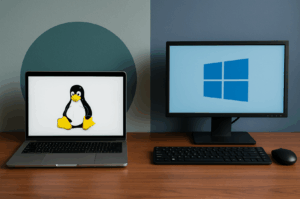Linux or Windows? A Practical Guide for Everyday Users
 The operating system is the backbone of every computer. Most people default to Windows, but there’s a powerful alternative: Linux. This article explains why Linux can be a great substitute for Windows 11, what advantages it brings, and which drawbacks you should expect.
The operating system is the backbone of every computer. Most people default to Windows, but there’s a powerful alternative: Linux. This article explains why Linux can be a great substitute for Windows 11, what advantages it brings, and which drawbacks you should expect.
When to Use Linux
- Everyday use & productivity: For web browsing, email, video streaming, office documents, and other common tasks, Linux provides everything you need. User-friendly distributions like Ubuntu or Linux Mint offer smooth setup and a rich app catalog.
- Programming & development: Linux shines for developers with first-class tooling (languages, frameworks, containers) and wide adoption on servers and cloud platforms.
- Low hardware requirements: On older or low-power PCs, lightweight flavors such as Xubuntu or Lubuntu run faster and feel more responsive than a full Windows install.
- Security & privacy: Linux is known for robust security. With fewer malware targets and fast updates, it’s a safer default for many users.
- Open-source software: If you prefer free and open tools, Linux offers a huge selection for office work, graphics, development, and more.
- Learning & experimentation: Linux is ideal if you want to understand and customize your system. You can tweak almost everything—far beyond what Windows allows.
When to Use Windows
- Gaming: If you play the latest AAA titles or rely on anti-cheat systems that don’t work on Linux, Windows remains the safest choice.
- Specific commercial software: Apps like Microsoft Office (desktop), Adobe Photoshop/Premiere, AutoCAD, or specialized pro tools often run best—or only—on Windows.
- Peripheral compatibility: Some printers, scanners, game controllers, and specialty devices have better or exclusive Windows drivers.
- Corporate environments: If your workplace mandates Windows-only VPNs, management tools, or line-of-business apps, you’ll likely need Windows.
Price & Availability
- Linux: Most distributions are free and open source; you can download and install them without paying a license fee.
- Windows 11: Requires a paid license (often included with a new PC).
Security
- Linux: Strong security model, fewer malware targets, rapid updates from repositories.
- Windows 11: The biggest target for attackers due to market share. Includes advanced security features, but typically benefits from additional antivirus/EDR tools.
Stability & Performance
- Linux: Known for long uptimes and consistent performance over time.
- Windows 11: Optimized for modern hardware, but can slow down over long periods and heavy software turnover.
Flexibility & Customization
- Linux: Many distributions (Ubuntu, Debian, Fedora, Mint, Arch, etc.) and desktop environments (GNOME, KDE Plasma, Xfce) let you tailor the system to your workflow.
- Windows 11: Cohesive design, but with limited deep customization.
Software & Compatibility
- Linux: Rich open-source alternatives (e.g., LibreOffice for Office, GIMP for Photoshop). Some Windows apps run via Wine or Proton, but not all work perfectly.
- Windows 11: Broadest compatibility with commercial and professional software suites.
Gaming
- Linux: Support is improving thanks to Steam Play (Proton); many titles run well, but not everything is flawless.
- Windows 11: Best overall gaming support (DirectX, drivers, anti-cheat, launchers).
Support & Community
- Linux: Large, helpful communities (forums, wikis, chats) and vendor wikis (Ubuntu, Fedora, Arch, etc.).
- Windows 11: Official Microsoft support plus a wide ecosystem of paid and free help resources.
Installation & Ease of Use
- Linux: Modern installers (Ubuntu, Linux Mint, Fedora) are beginner-friendly. There is a learning curve for new users.
- Windows 11: Generally straightforward to install, but may involve license selection, online account setup, and vendor utilities.
Summary
| Factor | Linux | Windows 11 |
|---|---|---|
| Price | Free | Paid license |
| Security | Strong, fewer malware targets | Advanced features, popular malware target |
| Stability | High, long uptimes | Good, can slow over time |
| Flexibility | Extensive customization options | More limited |
| Software | Open-source alternatives, Wine/Proton | Best commercial app support |
| Gaming | Improving, not universal | Best overall support |
| Support | Community-driven | Official + third-party |
Bottom line: Linux is an excellent choice if you want a stable, secure, and customizable system for free. Windows 11 is ideal when you need maximum compatibility with commercial software and the best gaming experience. Choose based on your workload, hardware, and comfort level.
